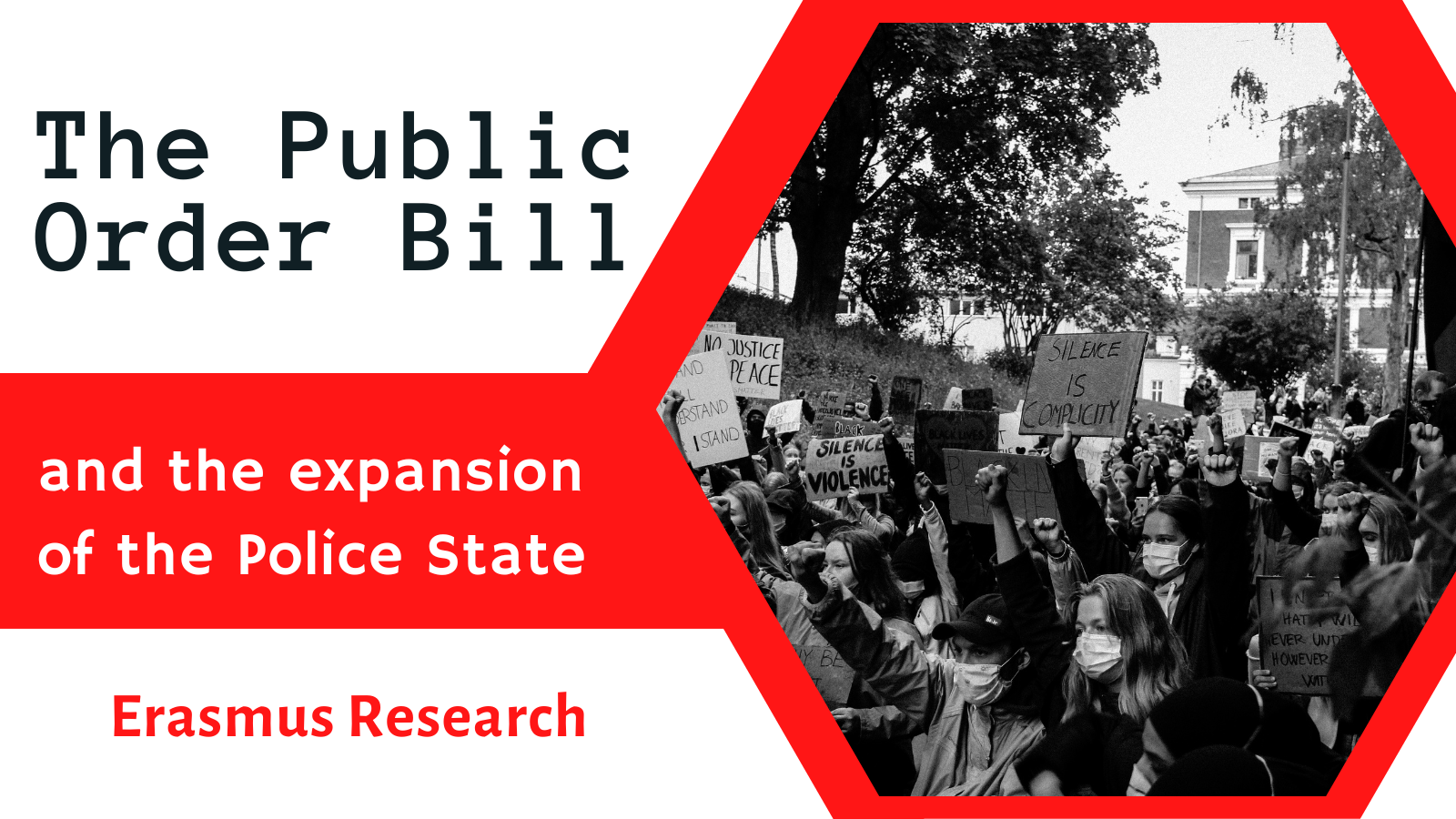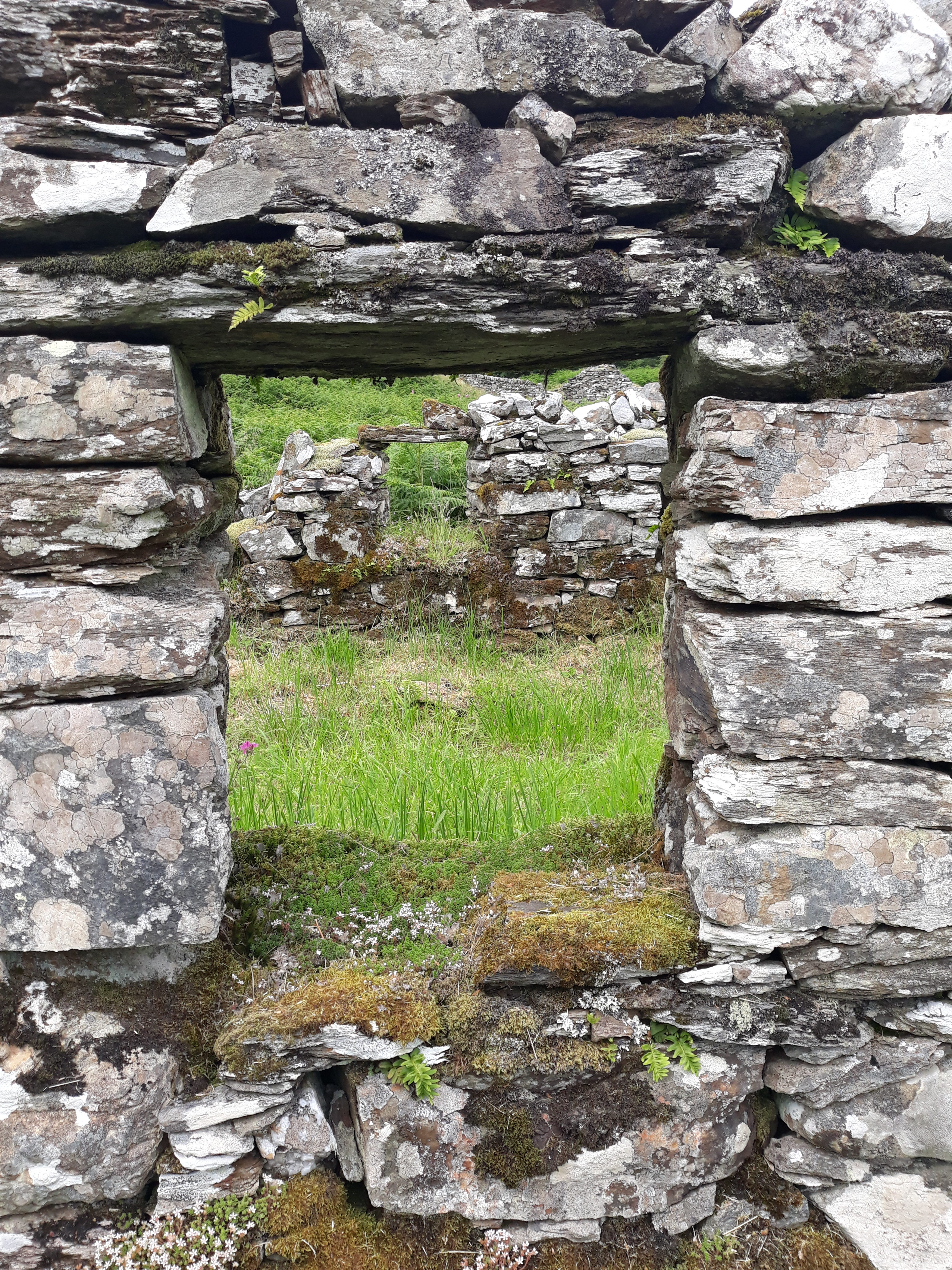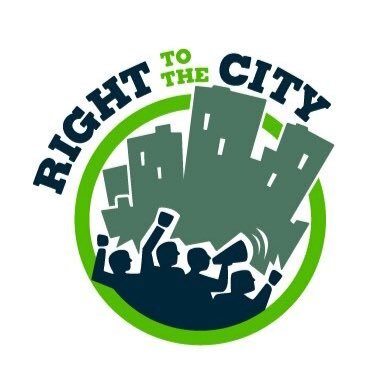The expanding criminalisation of social life is inseparable from the relentless expansion of the authoritarian police state.
By criminalising more aspects of our daily lives, more people are coming into contact with a police-state whose punitive logic ensures that it maximises the full potential of its monopoly on the legitimate use of violence. This expansion creates opportunities to expose the very myths that serve to legitimise the police state. The myth we wish to debunk here, is the widely held belief that the draconian measures contained in the Public Order Bill – measures that hand police yet more powers with even less accountability – are, or at least should be, reserved for the most ‘dangerous criminals’ in society. Our research findings show the extent to which the expansion of the authoritarian state has resulted in an increasing number of ordinary, ‘law-abiding’ citizens being subjected to some of the most draconian tactics available to the police.
George Monbiot, discussing the Public Order Bill, (below) describes it as the most repressive legislation of the modern era, involving the definitive termination of our right to protest. This, he points out, gives the police unprecedented levels of unaccountable power in dealing with anyone the police deem to be causing ‘serious disruption’ in the context of a protest. This, like a number of recent legislative enhancements, extends the categories of criminalisation to such an extent that almost anyone can be shoehorned into its ambit. In this case, anyone who has been on a demonstration or protest in the last five years, has encouraged anyone else to demonstrate in the last five years or supported a protest in the last five years can be subject to some of the most repressive, invasive and liberty-restricting police measures, short of being imprisoned for a lengthy period. Protestors (or their supporters) can be made to wear an electronic monitoring tag, report to police stations when ordered, surrender their electronic devices for examination, and even be detained during organised demonstrations – all at the total discretion of the police.
The issue here, is that Monbiot claims that these new police powers, unprecedented in their reach, will subject ordinary, and otherwise law-abiding protesters to the kinds of draconian interventions reserved for ‘the most dangerous criminals leaving prison’.
Monbiot is not the only one to draw upon the ‘normally reserved for dangerous criminals’ narrative. Tom Bowles, a photo-journalist who was arrested at a Just Stop Oil Protest with film maker Rich Felgate told Byline TV about his arrest and that while he was detained, three male police officers searched his house at 11pm with his wife and daughter both present. Both the interviewer and the photographer, articulating their disgust at the police tactics employed, then go on to discuss the orthodox belief that these ultra-authoritarian police practices are, or at least should be, reserved for the policing of ‘dangerous criminals’, and not ordinary citizens going about their daily jobs as reporters.
Both examples reflect a widely-held, misguided belief that such police violence is used only for ‘dangerous criminals’; something our research entirely refutes. The three case studies we would like to highlight include counterterrorism policing, the policing of public order in relation to offensive behaviour at football, and undercover political policing. They denote a phenomenon that has given rise to the current Public Order Bill and the unprecedented levels of unaccountable police power we are now experiencing.
Counterterrorism Policing.
Our research on both the Prevent programme and the on-going police harassment and intimidation of the Kurdish community living in Scotland shows the extent to which the police will use the maximum powers they have, in the most extreme ways possible, to police ‘suspect’ communities.
The Prevent programme places an obligation on mental health professionals to ‘refer’ Muslim men who approach them for help, to the UK’s counterterrorism police. Once a referral has been made by the mental health professional, the police will conduct a series of ‘risk assessments’, in the person’s home to determine the levels of monitoring and surveillance required for each person based on an assessment of perceived ‘risk’. Mental health professionals have been told by police to refer all Muslim men without exception, in order that they can avoid any ‘false negatives’. This pilot is currently being rolled out across the UK, with tens of millions of pounds being made available to ensure that the most invasive and draconian police practices will continue to be used, not on ‘dangerous criminals’, but on ordinary, law-abiding Muslim men who seek help for their mental heath problems.
Our interest in counterterrorism policing in Scotland arose when our attention was drawn to several newspaper reports that claimed the police had ‘smashed’ a terror network of Kurds operating in Edinburgh as well as a network of people who the police claimed had been funding terrorism. We decided to conduct an in-depth research programme interviewing those involved, and what we found was rather remarkable. While the newspapers gave the impression of significant seizures of weapons and money, the reality was very different. The productions submitted to the Crown Office and Procurator Fiscal’s Service (COPFS) showed that after three years of co-ordinated dawn raids on multiple homes in Edinburgh, the police had seized nothing more serious than a few YPG and YPJ key rings and badges, some books by Abdulla Ocalan, and some items of traditional Kurdish clothing. As for smashing the ‘network funding terror abroad’, the police had merely stolen one family’s rent money which was sitting on a table in the hallway awaiting collection by the landlord. None of the many devices, laptops and mobile phones confiscated by the police have ever been returned, including the stolen rent money. Although not one Kurdish person was actually charged by the COPFS, millions of pounds were spent in surveillance and monitoring the community, and some members were regularly followed, often on long distances in cars, by undercover police officers.
The orthodox myth is that counterterrorism police are busy catching ‘dangerous terrorists’, and keeping us safe. The reality is, that they spend all their time and resources trying to prove that individuals and groups, ‘support’ terrorist organisations, or are sympathetic to their cause. They do this because the law is written in such a way that they can prioritise support for terrorism, as evidence of terrorist activity. There are clear parallels here with the Public Order legislation. The law is written in such a way as to hand police maximum discretion with minimum accountability. Merely supporting a protest, can result in extreme police intervention.
Offensive Behaviour at Football
Another research project we undertook, this time on a much more ‘official’ basis, involved interviewing a number of football fans on both sides of the sectarian divide. What we found was that significant police resources were deployed to police the new offences created in the ill-fated Offensive Behaviour at Football and Threatening Communications (Scotland) Act 2012, which was designed to tackle Scotland’s sectarianism problem through a process of criminalisation. The police, went to great lengths to film football fans and to arrest and charge those they deemed to have sung an offensive song, while never at any point – defining what songs were, and what songs were not, ‘offensive’. By shifting the focus onto thought crime – trying to determine what a person ‘meant’ when they sang a song, and what its impact might be on those hearing it – the police were able to target a large group of mainly working-class men, in the hope of criminalising as many as possible under the terms of the Act.
The qualitative interview evidence we gathered from a series of focus groups paints an astonishing picture. One example came from a focus group we did which included six women, all good friends, all over 60, who took their grandchildren to most Celtic home matches and who travelled together to European games as well as the occasional away fixture.
Here is an account of one of the women:
“We were regularly being filmed by the police at matches. The police would stand right in front of us for the entire match, a handheld camera pointing in our faces the whole time. It was ridiculous. We’ve been going to the football since we were kids, and now we have the police filming us… We went to Amsterdam for the Ajax game and found ourselves the attention of a group of young men, about four of five of them. They followed us round the pubs, asking us daft questions about where we get our tickets, and where we sit at home games. I said to one of them, ‘listen son, I’m sure you are all nice enough lads, but don’t you think we’re a bit old for you?’ He turned and said, ‘oh, we’re not chatting you up, we’re the police, we’re here to police the singing of offensive songs. We were all flabbergasted. I mean, you can’t get a policeman to attend an actual crime in Glasgow. Yet here they are following us around Amsterdam, a group of grannies… They did the same a month later when we all went to Barcelona. The six of us got picked up at the airport when we came back, it was a friend from the pub who had a minibus. Not only did the police follow us back to the East End, they came into the pub when we stopped off for a drink. One of the guys we know said he was followed home from the pub one night by a helicopter. It’s pathetic. The police are pathetic.”
The next account is from a younger woman, 20 years of age:
“They (the police) must spend hours trawling through social media and information gathering. I went to an away game and one of the police officers came up and said Hi Maureen, where’s your boyfriend Sean? I was taken aback, I said, hang on, I’ve never told you my name, how do you know this about me? He said, ‘we know everything, we know your mum’s name, we know where you live, where you work, we know everything about you’. That’s them letting you know. It’s pure intimidation tactics. That’s what they do. They identify people at games they think might be singing songs and they wait till Monday morning and come to their work and arrest them. They make a huge scene. They try and ruin your life. They get you sacked; they criminalise you… all because they think you might have sung a song about the IRA.”
So again, not ‘dangerous criminals’ in receipt of some of the most draconian, punitive and harmful policing practices, just ordinary football fans, singing songs, some of which the police have deemed to be offensive.
Undercover Political Policing
The last case study relates to undercover political policing. Since the 1960s the UK police have been infiltrating political parties, trade unions, environmental campaign groups, and animal rights movements. A universal practice, as the ongoing Undercover Policing Enquiry has shown, was for officers to steal the identities of babies who had died in infancy, and use these to create a new identity for use in infiltrating targeted groups. A former ‘spycop’, under the protection of full anonymity, told the enquiry the practice was necessary, and that he was only sorry the parents of the dead babies had subsequently found out. In a significant number of cases, undercover police officers tricked women into sexual relations (the very definition of statutory rape) with some having children with their ‘targets’. Many of these officers were married at the time of their deployments with almost all of them disappearing from the lives of their targets after faking a mental breakdown, leaving heartache and devastation in their wake. The police regarded these victims as ‘collateral damage’, a necessary evil, used to infiltrate over 1000 political groups and campaign organisations. These were all perfectly legal groups, the vast majority of whom adopted legal, democratic and peaceful practices. In some cases where damage was done, the enquiry has found that undercover police officers were responsible for instigating and in many cases carrying out acts of vandalism, arson, and wilful damage to property.
Again, the victims of police harms and extreme practices were not ‘dangerous criminals’, they were innocent and upstanding human beings fighting for a better world.
The logical progression of the undercover policing of political thought crime brings us right up to the present. By the time you read this, the Public Order Bill will most probably have passed through Parliament unopposed. This Act will make protest of any kind illegal. As Monbiot points out in the clip above, almost no advancement in the rights of ordinary people, no end in immoral practices by corporations or the state, no improvement in the living conditions of the many, would ever have been achieved without protest. What we are about to see is the culmination of an ongoing political project that continues to transfer power and wealth from the many to the few.
As more and more middle-class liberals bump up against the savage practices of the police, empowered by more legislative enhancements to criminalise people, more and more of them will revert to the entirely mythical narrative that these hyper-punitive, ultra-draconian practices are and should be, reserved for ‘dangerous criminals’.
What our ongoing project is dedicated to expose is the fact that the police, the criminalising bureaucracies and the punishment system, remain largely anathema to us. The mainstream media and the entertainment industry, both also integral parts of the authoritarian state apparatus, have been pulling the wool over our eyes for decades. They have been presenting, through news reporting, film and TV shows, relentless copaganda. They have given the public, in almost every country in the world, a version of the police and policing, which bears virtually no relation to reality. The police in every state, are always and at all times, the state police. Dangerous criminals exist, but they’re nowhere nearly as big a threat to the state and the status quo than you, the ordinary citizen, who wants to campaign for a decent standard of living and basic package of human rights.







